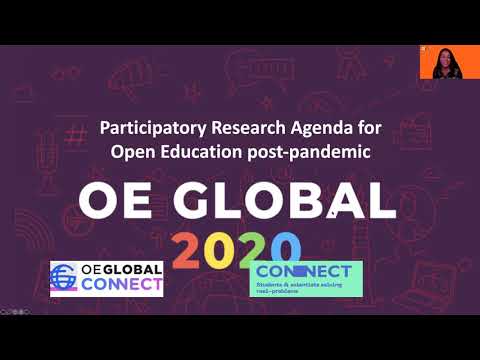Author: Alexandra Okada
Institution: The Open University
Country: United Kingdom
Topic: Global Collaboration, Strategies, & Policies in Open Education
Sector: Lifelong Learning
UNESCO Area of Focus: Developing supportive policy
Session Format: Workshop
Abstract
The World Bank and UNESCO indicated that the pandemic affected more than 160 countries. The estimated negative impact includes loss of learning and in human capital; high dropout rates, low learning outcomes and increased inequalities.This workshop part of CONNECT project aims to cocreate a collective research agenda for open education post-pandemic underpinned by key questions presented by OECD in the Future of Education and Skills 2030 report; whose aim is to help countries revise their education systems for the future:
- What kinds of competencies (knowledge, skills, attitudes and values) do today’s students need to thrive in and shape the future for better lives and for individual and societal well-being?
- How can learning environments be designed that can nurture such competencies with a meaningful curriculum implemented effectively?
- How can partnerships between policy makers, researchers, school leaders, teachers, students and social partners be established to help today’s students to develop the set of competences that they need to thrive in and shape their future?
- How will education 2030 prepare students for the economy 4.0, which includes smart manufacturing, decentralised production methods, blended worlds of production and network connectivity in which people, devices, objects and systems combine to form dynamic, self-organising networks of production?
CONNECT: Inclusive Open Schooling through Engaging and Future-oriented Science is a project funded by the European Commission (2020 - 2023). Its aims to develop a sustainable model for promoting partnerships between universities and schools including researchers, entrepreneurs, policy makers and civil society organisations to promote scientific literacy and increase learners’ engagement with “science with and for society” towards a sustainable world and desirable future.
Our aim is to publish the agenda in the Open Praxis Journal. Participants-collaborators are invited to be coauthors. This section requires pre-enrolment:
References:
OECD The future of education and skills Education 2030 https://www.oecd.org/education/2030/E2030%20Position%20Paper%20(05.04.2018).pdf
CONNECT: Inclusive Open Schooling through Engaging and Future-oriented Science
Keywords
open education 2030, scientific literacy, responsible research and innovation, collective agenda setting, fun participatory approaches, societal priorities post-pandemic
